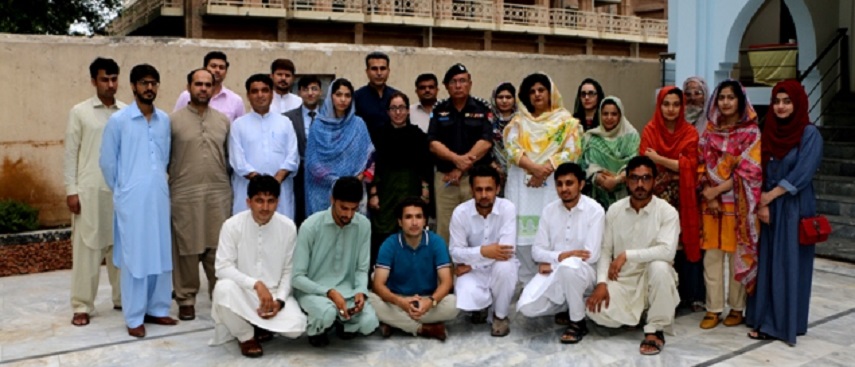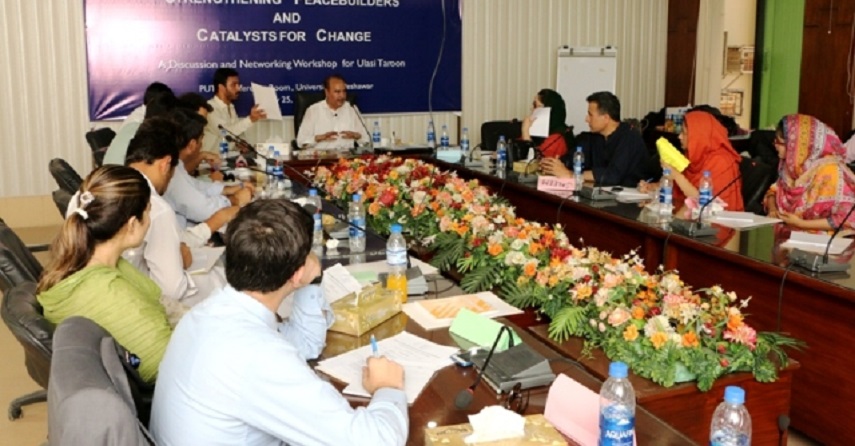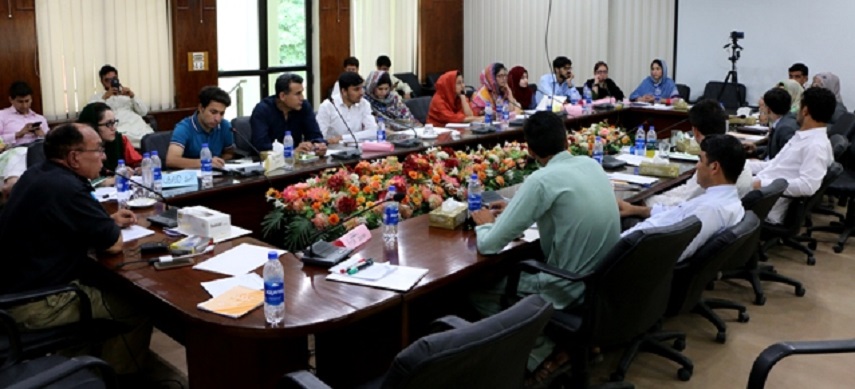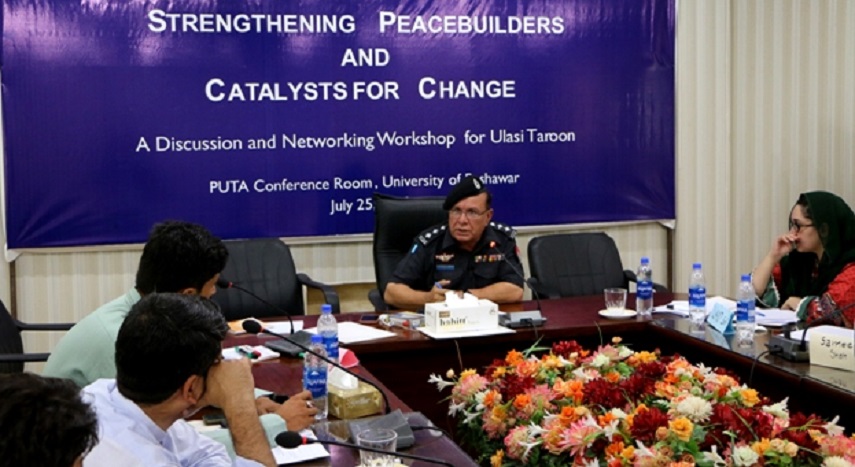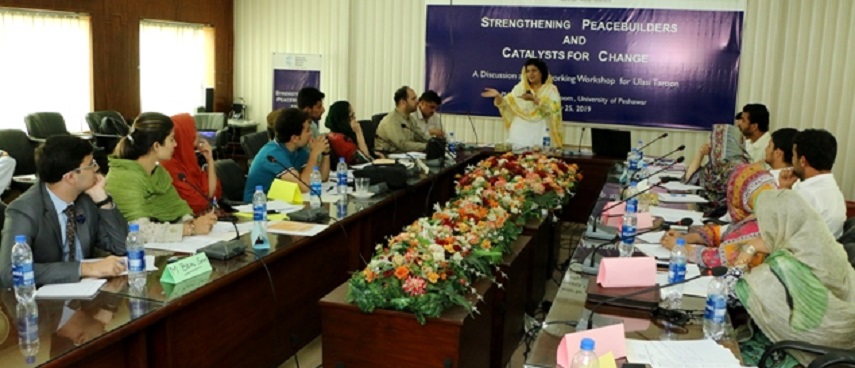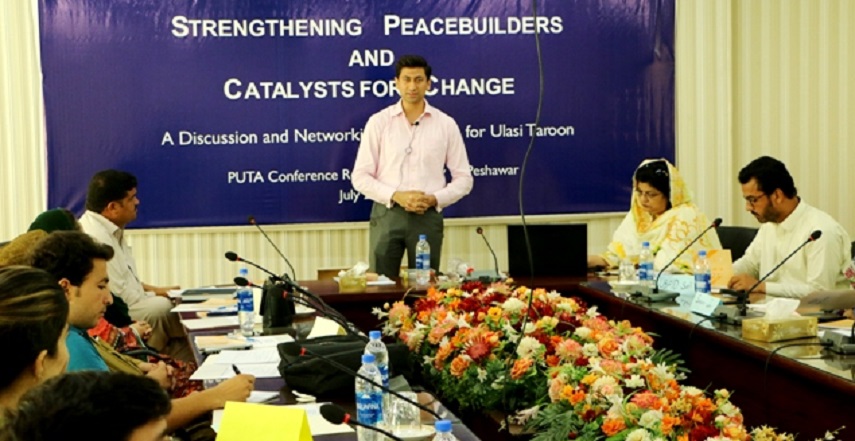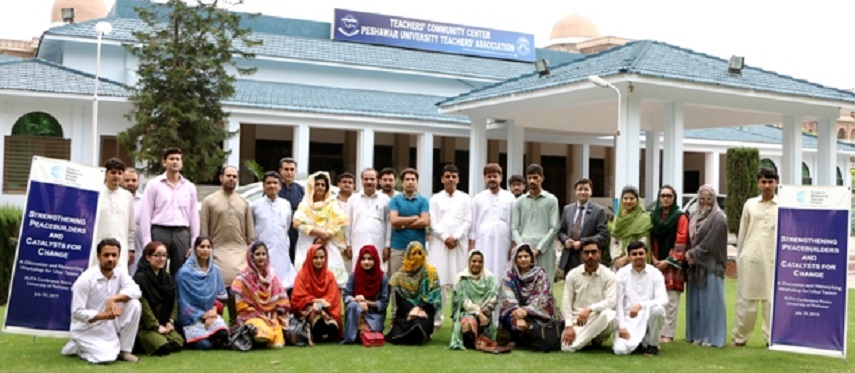As its foundational principle, the concept of democracy calls for respect for human beings and believes in the notion of human dignity and their participation in the decision making processes in all facets of life. The second most essential principle of democracy is pluralism, which means equal citizenry without any room of discrimination on the basis of color, cast, creed or gender, or for discriminatory attitudes in the society that are detrimental to the social cohesion.
The remarks were made by Dr. Khadim Hussain, Director, Bacha Khan Trust Educational Foundation, Peshawar during a discussion and networking workshop on social cohesion titled “Strengthening Peacebuilders and Catalysts for Change”, held by the Center for Research and Security Studies (CRSS) at University of Peshawar.
Dr. Khadim Hussain added that there should be equal opportunities of social mobility and socio-political and economic participation for all the members of the society, without any bias and regardless of their backgrounds. The notion of pluralism aims to empower the individuals of all faiths for their participation in the democratic processes as equal citizens; despite having different religious views.
Respect for human dignity demands respect for different opinions living in the society and exhibiting tolerance for diversity. People from different backgrounds have different concerns and interests and inclusive dialogue is only how they can articulate their issues and represent their respective communities. The inclusion; accommodation of different viewpoints is what actually adds immense value to the national discourse as well as lends a great power to the concept of democracy. Rejecting the diversity of opinions is absolutely contrary to the democracy. Only tolerance of and exhibiting respect for diversity can strengthen democracy and foster social cohesion in the society. Failure to celebrate diversity can lead to disintegration of and conflict in the society. Therefore, only through the fundamental principles of democracy – including human dignity, pluralism and diversity, can democratic system develop, prosper and continue. And the structure of democratic system is based on these fundamental principles and ideals of democracy.
The democratic principles are enshrined in the constitution vide core constitutional values – like respect for fundamental human rights and different opinions, tolerance for diversity, equality and adherence to rule of law. These all are the most essential prerequisites for social peace and cohesion. Deviation from constitution and giving up on rule of law can jeopardize democracy and lead to conflict. Only a democracy can ensure across the board accountability and rule of law where everyone is equal before and subject to law. One of the ways it empowers it citizens is through equal distribution of resources among them in an impartial manner.
“The legislature, executive and judiciary should only commit to their respective domains of legislation, execution and adjudication and violation of their constitutional limits will take an ultimate toll on democracy. The menace of Elitism is detrimental to the nourishment of democracy”, he concluded.
Mr. Saifullah Khan from KP Police, posted as Deputy Commandant Campus in the University of Peshawar, said that the primary consideration for law making during the legislative process is to benefit the public without discrimination. And everyone is accountable and subject to these laws no matter how powerful, including citizens and rulers. The implementation of laws in an indiscriminate manner is critical to uphold rule of law and strengthen democracy. Rule of law not only ensures peaceful coexistence of the citizens but also the state institutions. The menace of corruption is detrimental to rule of law and it is not just limited to financial corruption but also with regard to time and responsibility.
Rule of law can be greatly upheld with the active role and contribution of citizens at the core. Responsible citizenship demands mutual cooperation – with the fellow citizens as well as the institutions – to strengthen rule of law. While public is demanding rule of law, it is important for them realize and fulfill their respective roles and responsibilities. Only by adhering to law and cooperating with the law enforcement fraternity, can we uphold rule of law.
“Constitutional awareness and education are key to rule of law and social cohesion”, he concluded.
Ms. Shagufta Khalique, educationist, said that peacebuilding is an all-inclusive process which requires a holistic approach where people from all faiths are taken on board as the ideals of peace are enshrined in all the religions. The conflicts can be avoided if all parties to the conflict do not exceed their redlines and resort to dialogue for resolution.
Mr. Malik Mustafa, Manager Programs CRSS, said that the role of peacebuilders is vital to social cohesion who can contribute to communal peace and harmony by educating the society on the core constitutional values. These fundamental values of respect, tolerance and rule of law are essentialities for social cohesion and needed to be believed and practiced to create inspiring examples.
The participating peacebuilders from different organizations across Khyber Pakhtunkhwa (KP) were of the view that peace lies in mutual respect, tolerance, acceptance and freedom. The peacebuilders need support and resources for carrying out their social change drives effectively. They demanded that the education system in the country should be able promote critical thinking and sensitize the future leaders in the core values key to social cohesion. All citizens must know their rights and responsibilities enshrined in the constitution to be able to better articulate their position on the issues that concern them and to participate in the decision making processes in the country.
Ulasi Taroon is a counter radicalization initiative of CRSS that aims to address the radicalization challenges, extremist ideologies and foster social cohesion through a discourse anchored in the core constitutional values which are fundamentally essential prerequisites for social peace and harmony. The endeavor aims to cultivate and sensitize the youth – in the universities across KP – in the core values in the Pakistani constitution and our social contract. It’s an attempt to highlight the criticality of abiding by these ideals – such as adherence to rule of law, primacy and sanctity of constitution, equal citizenry, responsible citizenship, respect for fundamental human rights, tolerance for diversity and different opinions, inclusive democracy and good governance – as a measure of fostering social cohesion and peaceful co-existence.

